
The Nail in the Boot
Dec 31 1931
•1h 53m
•Drama, War
Banned in the Soviet Union for its "negative" content and never released, Kalatozov was forced to retreat from filmmaking for seven years because of this film. The film sets out to illustrate the old adage, "For want of a nail, the battle was lost," showing how the inferior quality of something so trivial as a nail in a soldier's boot leads inexorably to the capture of an armored train. Kalatozov had intended to demonstrate the crucial and universal importance of efficiency in Soviet industry, but the government decided that his fable gave a negative impression of the Red Army's capabilities.
Cast
See allAleqsandre Jaliashvili
Siko Palavandishvili

Akaki Khorava

Arkadi Khintibidze
Recommendations
See all
Chuji's Travel Diary: The Chuji Patrol Episode
The Japanese equivalent of penny dreadfuls glorifying Jesse James, A Diary of Chuji’s Travels gives a unique gloss to the tale of Chuji Kunisada, the legendary bakuto (or gambler, the precursors to modern-day yakuza). One of the two remaining segments of Ito’s original four-hour trilogy, it depicts Chuji’s attempt to save the geisha Oshina, a rebellion against the rigid social structure of Edo Japan. With socialist overtones, it’s a passionate artifact of early Japanese film.

The Art Of Waiting
Liran and Tali, a couple in their thirties who dream of having a child together, are one day told that they will have to undergo fertility treatments. What seems simple at first turns out to be very complex.

Skin of a Mandarin
The film delicately follows 25-year-old Anna, whose mother has died suddenly. She wants to send her Orthodox mother on her last journey according to customs, but she runs into bureaucratic rules that do not allow Anna to dress her departed mother herself. This conflict brings her together with Maria, a 45-year-old funeral home worker, who in this story represents the hidden fears of death and grief on a deep emotional level.

Tuhottu nuoruus
Kirsti works as a reception assistant to Dr. Varjo and is secretly clinging to the doctor's son, Eino, who is studying to become an architect. Even though the film reflects early social problems and class jokes, there is no humor about describing everyday life.